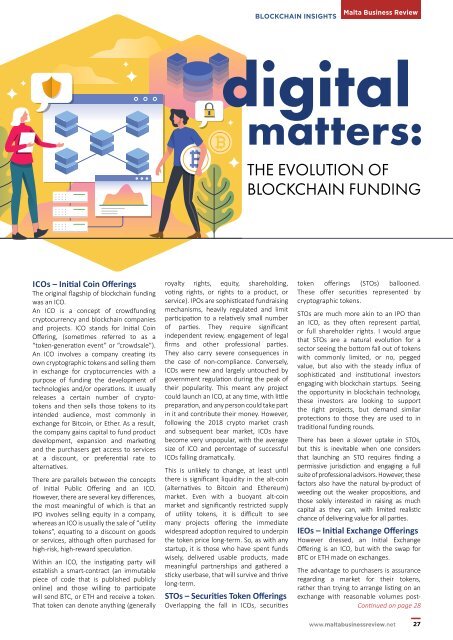MBR_ISSUE 54
A market place for the business community
A market place for the business community
You also want an ePaper? Increase the reach of your titles
YUMPU automatically turns print PDFs into web optimized ePapers that Google loves.
BLOCKCHAIN INSIGHTS<br />
Malta Business Review<br />
digital<br />
matters:<br />
THE EVOLUTION OF<br />
BLOCKCHAIN FUNDING<br />
ICOs – Initial Coin Offerings<br />
The original flagship of blockchain funding<br />
was an ICO.<br />
An ICO is a concept of crowdfunding<br />
cryptocurrency and blockchain companies<br />
and projects. ICO stands for Initial Coin<br />
Offering, (sometimes referred to as a<br />
“token-generation event” or “crowdsale”).<br />
An ICO involves a company creating its<br />
own cryptographic tokens and selling them<br />
in exchange for cryptocurrencies with a<br />
purpose of funding the development of<br />
technologies and/or operations. It usually<br />
releases a certain number of cryptotokens<br />
and then sells those tokens to its<br />
intended audience, most commonly in<br />
exchange for Bitcoin, or Ether. As a result,<br />
the company gains capital to fund product<br />
development, expansion and marketing<br />
and the purchasers get access to services<br />
at a discount, or preferential rate to<br />
alternatives.<br />
There are parallels between the concepts<br />
of Initial Public Offering and an ICO.<br />
However, there are several key differences,<br />
the most meaningful of which is that an<br />
IPO involves selling equity in a company,<br />
whereas an ICO is usually the sale of “utility<br />
tokens”, equating to a discount on goods<br />
or services, although often purchased for<br />
high-risk, high-reward speculation.<br />
Within an ICO, the instigating party will<br />
establish a smart-contract (an immutable<br />
piece of code that is published publicly<br />
online) and those willing to participate<br />
will send BTC, or ETH and receive a token.<br />
That token can denote anything (generally<br />
royalty rights, equity, shareholding,<br />
voting rights, or rights to a product, or<br />
service). IPOs are sophisticated fundraising<br />
mechanisms, heavily regulated and limit<br />
participation to a relatively small number<br />
of parties. They require significant<br />
independent review, engagement of legal<br />
firms and other professional parties.<br />
They also carry severe consequences in<br />
the case of non-compliance. Conversely,<br />
ICOs were new and largely untouched by<br />
government regulation during the peak of<br />
their popularity. This meant any project<br />
could launch an ICO, at any time, with little<br />
preparation, and any person could take part<br />
in it and contribute their money. However,<br />
following the 2018 crypto market crash<br />
and subsequent bear market, ICOs have<br />
become very unpopular, with the average<br />
size of ICO and percentage of successful<br />
ICOs falling dramatically.<br />
This is unlikely to change, at least until<br />
there is significant liquidity in the alt-coin<br />
(alternatives to Bitcoin and Ethereum)<br />
market. Even with a buoyant alt-coin<br />
market and significantly restricted supply<br />
of utility tokens, it is difficult to see<br />
many projects offering the immediate<br />
widespread adoption required to underpin<br />
the token price long-term. So, as with any<br />
startup, it is those who have spent funds<br />
wisely, delivered usable products, made<br />
meaningful partnerships and gathered a<br />
sticky userbase, that will survive and thrive<br />
long-term.<br />
STOs – Securities Token Offerings<br />
Overlapping the fall in ICOs, securities<br />
token offerings (STOs) ballooned.<br />
These offer securities represented by<br />
cryptographic tokens.<br />
STOs are much more akin to an IPO than<br />
an ICO, as they often represent partial,<br />
or full shareholder rights. I would argue<br />
that STOs are a natural evolution for a<br />
sector seeing the bottom fall out of tokens<br />
with commonly limited, or no, pegged<br />
value, but also with the steady influx of<br />
sophisticated and institutional investors<br />
engaging with blockchain startups. Seeing<br />
the opportunity in blockchain technology,<br />
these investors are looking to support<br />
the right projects, but demand similar<br />
protections to those they are used to in<br />
traditional funding rounds.<br />
There has been a slower uptake in STOs,<br />
but this is inevitable when one considers<br />
that launching an STO requires finding a<br />
permissive jurisdiction and engaging a full<br />
suite of professional advisors. However, these<br />
factors also have the natural by-product of<br />
weeding out the weaker propositions, and<br />
those solely interested in raising as much<br />
capital as they can, with limited realistic<br />
chance of delivering value for all parties.<br />
IEOs – Initial Exchange Offerings<br />
However dressed, an Initial Exchange<br />
Offering is an ICO, but with the swap for<br />
BTC or ETH made on exchanges.<br />
The advantage to purchasers is assurance<br />
regarding a market for their tokens,<br />
rather than trying to arrange listing on an<br />
exchange with reasonable volumes post-<br />
Continued on page 28<br />
www.maltabusinessreview.net<br />
27




